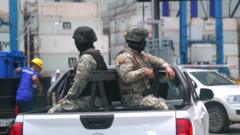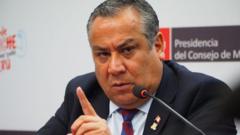As Ecuador becomes a major cocaine exporter due to a complex trafficking network led by the Albanian mafia, the rising consumption in Europe intensifies violence and corruption. Local residents bear the brunt of the drug trade's deadly consequences, calling for greater accountability from consumer nations.
A Dangerous Supply Chain: Cocaine Trafficking in Ecuador and Its European Impact

A Dangerous Supply Chain: Cocaine Trafficking in Ecuador and Its European Impact
The burgeoning cocaine trade in Ecuador reveals a grim connection to rising European demand, drawing scrutiny to the role of organized crime.
The Albanian mafia has established a stronghold in Ecuador, using the country as a key transit point for cocaine heading to Europe. Despite Ecuador not producing cocaine itself, approximately 70% of the world's illicit drug supply now flows through its ports, primarily from Colombia and Peru. This alarming trend has sparked a surge in violence, with January 2025 registering a staggering 781 murders, largely attributable to drug-related conflicts.
Local gang members like César (a pseudonym) describe the grim realities they face. Pressured by the Albanian mafia, César details his role in smuggling drugs through corrupt networks within Ecuador's ports. It's a dangerous existence; if he refuses to comply with the mafia's demands, he risks his life. He acknowledges the cycle of violence perpetuated by growing European drug consumption, urging that serious action is needed in consumer countries to combat the issue.
Ecuadorian truck drivers, such as Juan (another pseudonym), unknowingly participate in this insidious drug trade. When tasked with delivering seemingly innocent shipments, they often later discover those containers harbor substantial quantities of cocaine. Corruption runs deep, with some drivers coerced into participating in the drug trade or facing deadly consequences for refusal.
Ecuador's strategic location and export activities make it an attractive hub for criminal organizations. The banana export industry, accounting for a significant percentage of shipping containers, has been misused to mask narcotics. Prosecutors reveal how drug traffickers disguise their operations, using legitimate business fronts to launder illicit profits.
Despite the authorities’ increasingly vigilant measures at ports, a record 300 tons of cocaine were seized last year, with projections indicating a continued rise. Citing economic factors and post-pandemic vulnerabilities, experts contend that Ecuadorean society is ripe for gang recruitment. The surge in organized crime can be traced back to the Albanian mafia's infiltration, coinciding with booming banana exports and financial instability within Ecuador.
To highlight the profound impacts of cocaine consumption in Europe, the UK's National Crime Agency reports a substantial market driven by rising demand. With millions spent on cocaine yearly, they estimate that organized crime profits exceed billions. Citing the human cost of this drug trade, activists underscore how the consequences reach beyond Ecuadorean borders, affecting families and communities globally.
Ecuador's President Daniel Noboa emphasizes that the drug trade not only fosters violence but also tarnishes the nation's reputation. He calls for a united global effort to address the root demand for cocaine and challenge the organized crime structures profiting from the trade. As violence surges and the supply chain deepens, the call for responsibility and evolution in consumer nations has never been more pressing.





















